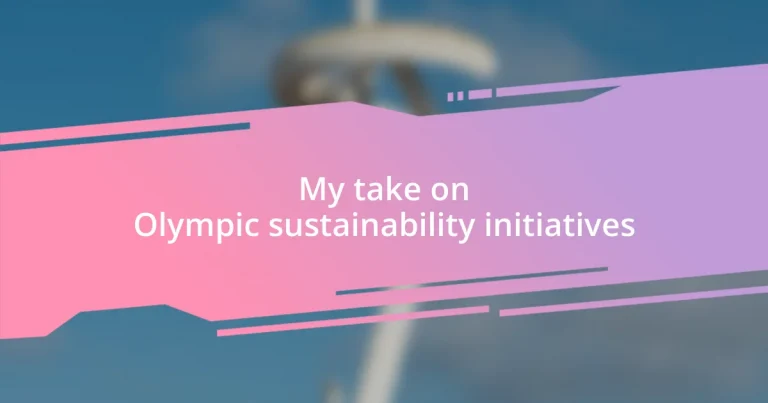Key takeaways:
- The International Olympic Committee aims to make the Games climate positive by 2030, with a growing focus on eco-friendly practices demonstrated during events like Tokyo 2020 and more recent Olympics.
- Successful sustainability initiatives, such as those in London 2012 and Beijing 2022, showcase the potential for reduced environmental impact and long-lasting legacies through community engagement and innovative technologies.
- Challenges in implementing sustainability include stakeholder coordination, financial constraints, and logistical complexities, but future trends emphasize the role of technology and community involvement in overcoming these obstacles.

Overview of Olympic sustainability initiatives
When I think about Olympic sustainability initiatives, I’m struck by the sheer scale of what’s being attempted. The International Olympic Committee, or IOC, has committed to making the Games climate positive by 2030. This isn’t just an ambitious goal; it’s a necessary shift in how major events are organized, encouraging a broader conversation about environmental accountability.
I remember watching the Tokyo 2020 Games, which, despite the pandemic challenges, showcased some impressive eco-friendly practices. For instance, they utilized recycled materials for medals and built venues using sustainable methods. It’s inspiring to see how the Olympics are beginning to embrace practices that not only benefit the athletes but also honor our planet—wouldn’t it be amazing if every large event followed suit?
The ongoing commitment to sustainability doesn’t stop at event preparation; it extends to community engagement as well. Many host cities are now investing in long-term sustainable development, ensuring that the legacy of the Olympics includes green infrastructures, like improved public transport and energy-efficient buildings. Isn’t it exciting to think about how much we can learn from these initiatives?

Importance of sustainability in sports
Sustainability in sports is crucial not just for the environment, but also for preserving the integrity of the games we love. I remember attending a local sporting event a few years ago that made a conscious effort to minimize waste with reusable cups. It left me feeling proud; such small changes can significantly impact how we think about resource use in the world of sports.
Here are a few reasons why sustainability is pivotal in this arena:
- Environmental Impact: Reducing carbon footprints helps combat climate change, which affects everyone, including athletes.
- Economic Benefits: Sustainable practices can save money in the long run by lowering resource costs and attracting eco-conscious sponsors.
- Social Responsibility: Embracing sustainability demonstrates a commitment to community well-being and inspires fans to engage in similar initiatives.
Every time I see a sporting event prioritizing sustainability, it ignites a spark of hope—that perhaps we can turn the tide on climate change together.

Case studies of successful events
One shining example of successful sustainability in Olympic events is the London 2012 Games. They aimed to be the “greenest” Olympics to date, implementing various measures such as using renewable energy for venues and emphasizing public transportation. I can recall watching the events unfold and feeling a sense of pride knowing that thousands of people were able to reduce their carbon footprint simply by taking the Tube instead of driving. This initiative not only showcased sustainable practices but also fostered a long-standing impact on how cities approached major events afterward.
The most recent example I find remarkable is the Beijing 2022 Winter Olympics, which focused on creating a low-carbon footprint across its venues. They integrated advanced technologies like artificial snow-making systems that minimized water usage. I vividly remember scrolling through social media, seeing stunning pictures of the games, and marveling at how eco-friendly innovations were transforming the sports landscape. These initiatives genuinely made me feel optimistic about the future—imagine how much more we could achieve with a commitment to sustainability in every Olympic cycle!
It’s essential to recognize the initiatives taken during the Rio 2016 Olympics. The city integrated social and environmental sustainability by cleaning up the Guanabara Bay, where many events were held. While the execution wasn’t without flaws, it sparked conversations about environmental stewardship that lingered long after the games concluded. Reflecting on that time, I couldn’t help but think of the emotional connections people build through sport. When we champion sustainability, we create a bond not just with our favorite athletes but also with the planet itself.
| Event | Sustainability Initiatives |
|---|---|
| London 2012 | Emphasized renewable energy and public transport. |
| Beijing 2022 | Implemented low-carbon technologies and water-efficient snow-making. |
| Rio 2016 | Focused on environmental cleanup and social sustainability. |

Challenges faced in implementation
Implementing sustainability initiatives at the Olympic level can feel like navigating a labyrinth. From my perspective, one of the primary challenges is the coordination among diverse stakeholders—governments, sponsors, and local communities all have their own priorities. I’ve often wondered, how can such different agendas align to create a cohesive sustainability strategy? It takes extraordinary effort and, frankly, a lot of compromise.
Moreover, financial constraints pose a significant hurdle. While many organizers recognize the long-term benefits of sustainability, immediate costs can be daunting. I remember reading about the backlash against some eco-friendly projects for the Tokyo 2020 Olympics, where critics pointed to high expenditures instead of celebrating innovation. How do you convince stakeholders to invest in something that may not show immediate returns? It’s a delicate balancing act that often leaves sustainability projects sidelined.
Finally, the complexity of logistics can’t be overlooked. Planning and executing eco-friendly practices across sprawling venues demands meticulous attention to detail. When I think about the countless times I’ve seen event organizers struggle with waste management or energy efficiency, I can’t help but empathize with their challenges. These issues remind us that while the dreams for a sustainable Olympic future are grand, the road to implementation is often riddled with obstacles and real-world limitations.

Future trends in Olympic sustainability
The future of Olympic sustainability looks promising, primarily because of technology’s growing role in eco-friendly initiatives. I’ve always been fascinated by how innovations can transform our approach to events. Imagine smart energy grids that dynamically adjust to real-time energy needs at venues—this could drastically reduce waste! As I dream of attending future Games, I can’t help but wonder how these advancements will reshape my experience as a spectator.
Additionally, there’s a rising emphasis on circular economies within sports events. This concept revolves around minimizing waste and maximizing resource reuse. I remember chatting with a friend who attended a local sports event where they implemented a zero-waste policy. It was inspiring to see fans actively participating in recycling and composting efforts. I envision a scenario where spectators at the Olympics play a similar role, contributing to sustainability while cheering for their favorite athletes. How empowering would it be to leave a legacy of environmental responsibility rather than waste?
Furthermore, I see notable progress in community engagement being a trend for future Olympics. For instance, proposals to involve local residents in the planning process could create a sense of ownership and responsibility. Reflecting on my own experiences, I recall how powerful it felt to vote on community projects in my neighborhood. The thought of communities rallying around their cities to create a sustainable legacy for the Olympics genuinely excites me. It’s an uplifting prospect—bringing people together not just for sport, but for the planet as well.

How to support these initiatives
Supporting Olympic sustainability initiatives is something we can all participate in, both as individuals and through collective actions. One practical way to contribute is by attending events that prioritize sustainable practices. I recall the excitement I felt during a local trail race that included recycling stations and reusable water bottles. It wasn’t just about the competition; it felt like we were all part of a larger movement towards eco-consciousness. When I’m at the Olympics, I’ll be looking for similar efforts and will cheer louder for those who prioritize the planet.
Another impactful way to support these initiatives is to advocate for and choose sustainable merchandise. When I read about the Tokyo 2020 Games using recycled materials for uniforms, it made me realize how much our purchasing decisions matter. Imagine if we all opted for products that align with our values! It sends a powerful message to sponsors and organizers that we care about sustainability, and it can drive them to continue investing in eco-friendly options. Every shirt or souvenir I buy could help tip the scales toward a greener future.
Lastly, engaging in conversations about sustainability can amplify awareness and inspire others to take action. I remember attending a casual meetup where we discussed our favorite eco-friendly brands, and the energy was infectious. Sharing personal insights or stories about sustainability efforts at events can ignite curiosity and drive change. As we cultivate this dialogue, I can’t help but wonder—what could happen if every Olympic fan became an advocate for sustainability? The ripple effects could be significant!














